Aoi Bungaku‘s adaptation of “Run, Melos” weaves multiple narratives together into one complex but coherent story, masterfully utilizing the mise en abyme technique to its fullest potential. Although each narrative strand is merely a simple reflection of the legend of “Damon and Pythias,” they build and build upon each other in a unique way to deliver a refreshing story of vengeance, forgiveness, understanding and, naturally, love.
Takada struggles with his latest assignment because it evokes in him memories long forgotten. Fifteen years ago, Takada was waiting for his dear friend Joushima to join him in a new life in Tokyo, but when the time came to pass, Takada found himself riding the train to the new life alone. Feeling crushed and utterly betrayed, even fifteen years later, “Run, Melos” becomes more than just another project. In this simple story lies the key to Takada’s trauma: will Takada forgive Joushima after all these years or will he “kill” Joushima for good? Each character in the play represents an aspect of Takada.
The cynical tyrant Dionys represents Takada’s anger, an older version of himself twisted by mankind’s betrayal. He espouses Takada’s current pessimistic view of the world:
Dionys: You can’t guess what people are thinking. You can’t trust them.
He is also the tyrant because he represents Takada as the author, the God of the text. As the author, the fates of the characters are completely within Takada’s hands. To mirror this idea, the fates of both Melos and Selinuntius lie in Dionys’s hands.
At the surface, Selinuntius represents Joushima; after all, in Takada’s mind, they both share the same face. Whether or not Selinuntius survives determines whether or not Takada has finally decided to forgive Joushima for his betrayal or “kill” him off entirely. The roles have been reversed: rather than Takada waiting for Joushima at the train station, it is now Joushima, through Selinuntius, who must endure the agonizing wait for Takada, through Melos, to return. When Joushima gave Takada the pocket watch as a memento of their love, Takada returned it to him in spite by throwing it out the window of the moving train. Within the story, the act of Selinuntius bestowing the pendant upon Melos is a metaphor for a second chance: this time, Takada can return the pendant to Joushima as a token of friendship and not hatred.
If we dig deeper still, however, we can see that Selinuntius also represents a younger, idealistic Takada. His complete trust in Melos mirrors Takada’s complete trust in Joushima up until their fateful separation. While Takada is struggling to save Joushima by writing “Run, Melos,” he is also fighting to save the younger Takada. When Dionys offers to absolve Melos of his crimes should he choose to return late and thus allowing Selinuntius to die, Takada is struggling between his older, cynical self and his younger, idealistic self. He could face old wounds and painful memories in trying to understand and forgive Joushima for his betrayal. If so, Takada could regain his former self, the young man with a positive outlook of the world and the ability to be creative. On the other hand, he could take the easy way out and just forget Joushima for good, i.e. kill Selinuntius. In choosing this path, however, Takada would lose his innocent self forever. It would seem that the bitter Takada had overtaken his real self anyhow:
I saved Melos till the very last because he is the most complex character within the play. He is supposed to represent the ideal Takada, what Takada truly wishes to be. Being the hero, Melos is supposed to be the one with the power to be both savior and traitor. Unlike the young Takada, who was betrayed at the train station by Joushima, Melos would not have a passive role. The problem, however, is that Melos is fiction; his inspiration should come from Takada and not the other way around. Takada was writing “Run, Melos” with the hopes that the positive ending to the story, the triumphing of love and trust, would give Takada strength to see beyond Joushima’s betrayal to understand and forgive his former friend. Unfortunately, Melos is powerless if Takada is powerless.
We can see Melos’s powerlessness from the very start, starting with his struggles early on against the tyrant:
He is, however, unable to defeat Dionys through brute force, just like how Takada is unable to overcome his own pain through brute exertion of energy:
“Run, Melos” is thus a thought experiment for Takada. If he could see Melos returning to Selinuntius against all odds, perhaps he could too come to forgive Joushima. Melos’s struggles literally play out before Takada’s eyes:
But Takada’s mental exercise also fails because Melos isn’t fighting for the right reasons. At one point, Melos fights off bandits, claiming that he must return to Selinuntius out of justice:
But this, however, is a hollow sentiment that fails to grasp what Selinuntius is truly feeling as he awaits Melos’s arrival:
For Melos to gain the true strength that he needs to return to Selinuntius, he must understand more than abstract, impersonal concepts such as justice and truth — he has to understand the pain of “the person who waits.” Likewise, for Takada to forgive Joushima, he can’t simply do it through Melos; Melos’s strong character of virtues is not enough. Takada has to understand that while he suffered much pain being “the person who waits,” his friend must have suffered as well as “the person who makes others wait.” Forgiveness is about understanding and it seemed that deep down, Takada knew this all along:
Just as Melos was about to fail, he then takes on Joushima’s face. He then pleads to the audience, specifically to Takada, that he never wanted to hurt Selinuntius, i.e. young Takada. In reality, this is still Takada struggling with himself. He knows that Joushima must have had his reasons for his betrayal, but the pain was and is still too much as he screams,
Strong pain will usually blur out other feelings. Deep down, Takada has nothing but positive memories of Joushima:
Through “Run, Melos,” Takada is coming to grips with the fact that Joushima was always a true friend, one that always trusted in Takada’s ability as a playwright. These memories couldn’t help but resurface in a hallucination scene when Takada returns to his room to find Joushima imploring him not to tear up “Run, Melos:”
One act of betrayal may have hurt Takada greatly, but through this hallucination, he starts to realize that one act could not erase an entire history of friendship. To illustrate this in another way, in the movie Eternal Sunshine of the Spotless Mind, when Clementine erased all her memories of Joel, Joel’s retaliated by choosing to do the same. In anger and sadness, he chose rashly to delete all his memories of Clementine regardless of whether or not they were good or bad. During the process, however, Joel realized that while there were plenty of painful memories between them, there were also positive memories he had neglected due to their painful breakup. Similarly, the pain of Joushima’s betrayal was so great that Takada had forgotten how close they used to be. It is only through the process of writing “Run, Melos” that he once again realized Joushima was still his friend despite the betrayal. More importantly, as a friend, Joushima too must have felt great pain on that fateful night. It is at this point that Takada is beginning to understand and thus forgive Joushima.
Ironically, it is then Takada who first has the strength to return to his friend at all costs. It is thus Takada from whom Melos draws inspiration to complete his journey. Takada was hoping to emulate the ideal version of himself, i.e. Melos, but in the end, he realizes that Melos is just fiction. Melos’s struggle to return to Selinuntius out of justice and truth is meaningless. He needs to do it out of love, mirroring Takada’s strength and courage to understand and forgive Joushima.
Joushima was begging for forgiveness on his deathbed. The ending to “Run, Melos” would determine whether or not Takada had forgiven him. In the end, Melos returns to Selinuntius, wearing practically nothing but the pendant his friend had given him. It is neither justice nor truth that gave Melos strength. Instead, it was the love between them, their friendship symbolized by the pendant.
The story thus comes full circle: with the return of the pendant within the play, Takada regains his old friendship by accepting the old pocket watch from Joushima’s son.
At this point, I want to go in a slightly different direction. The depth of the love between Takada and Joushima is interesting. Joushima had a wife and child, so it’s tempting to say Takada and Joushima were merely close friends, but I don’t think it’s that simple. Note the way Melos’s face is being held by Selinuntius. There is one more play within this story to consider: Romeo and Juliet.
The striking connection between these two scenes can’t be accidental. Furthermore, it is also interesting to note that both men play the parts of both Romeo and Juliet, although Takada would primarily play Juliet once Joushima entered the scene. Likewise, Joushima primarily played Romeo, though he utters a line of Juliet to remind Takada of his “place.” Similarly, Melos primarily represents Takada, becoming Joushima for only a short while, and Selinuntius directly represents Joushima although it is in fact another aspect of Takada.
In fact, the two men were acting out Scene I of Act 2 of Romeo and Juliet, starting exactly where Romeo compares Juliet to the sun:
It is the east, and Juliet is the sun.
Arise, fair sun, and kill the envious moon,
While Takada is reciting these lines, he is moving from the winter exterior full of snow and cold tones:
And as he is getting closer to Joushima, he moves into the interior full of sunlight and warmer tones:
This motif is repeated at the end of the arc. As Takada is racing home to a dying Joushima, he fights the cold elements: he bikes through rain and rides a train through snow. As he nears Joushima, however, the sun has come up. Joushima’s room is awash with sunlight and warm tones as the two friends reconcile.
Back to the Romeo and Juliet scene anyhow, Takada doesn’t at first realize that Joushima was in the room. Joushima surprises him just as Juliet was surprised to find Romeo standing before her in the garden. They then recite the following lines:
Takada: How camest thou hither, tell me, and wherefore?
Joushima: With love’s light wings did I o’er-perch these walls;
Love and love alone led Romeo to Juliet. This is strikingly similar to how love led both Melos back to Selinuntius and Takada back to Joushima. What I find most interesting, however, are the unspoken lines. The two men skip over a lot of the play, and we could assume that these lines were extraneous and irrelevant to the story. I would suggest, however, that they represent the subtler relationship between Takada and Joushima. In these unspoken lines, Juliet laments that Romeo is unfortunately a Montague; society would never allow their love to exist. Yet in this private moment in the garden, it is allowed to bloom however fleetingly. Was there an unspoken love between Takada and Joushima that could never bloom in a Japanese society circa 1935? Was it a love that could only bloom fleetingly in the privacy of their college dorm?
We could read between the lines. Why was Takada so crushed by Joushima’s betrayal?
Speaking personally, should my best male friend abandon me, I’m not sure I would have reacted so strongly. On the other hand, should my lover abandon me, I think I could relate. Furthermore, why didn’t Joushima run off with Takada?
Recall that Joushima’s father held a position of influence in the community and something like his son running away with a guy to Tokyo could have been a potential catalyst for nasty rumors and speculations. Am I saying that the relationship between the two men was homosexual? No, we really can’t specify what their relationship really was (I will say, however, that having a wife and child doesn’t say much since many homosexual men have families for various reasons), but we do know that it was a deep and complicated relationship and I don’t think the choice to use Romeo and Juliet was accidental on the part of Madhouse. After all, they could have chosen countless of other plays for Takada and Joushima to recite.
Nevertheless, “Run, Melos” was a captivating adaptation of Dazai’s simple story. On its technical merits, I was pleased to recognize a few songs from Moryo no Hako‘s soundtrack; in fact, even the aesthetic of these two episodes reminded me of that great series. Out of the four works adapted thus far, I think “Run, Melos” looked the best and the soundtrack was fitting. Kokoko‘s soundtrack was simply bizarre to me, for instance.
On a lighter note, does anybody hate this guy as much as I do? Everything about him screams corny to me.


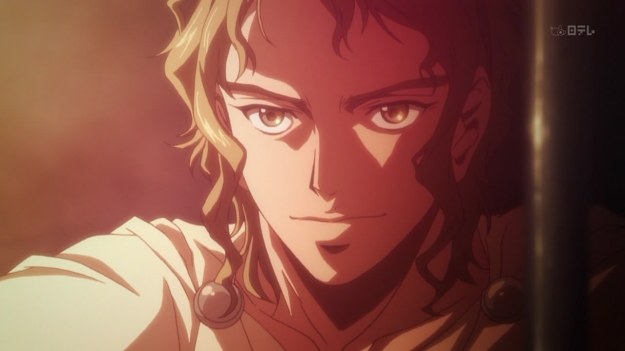

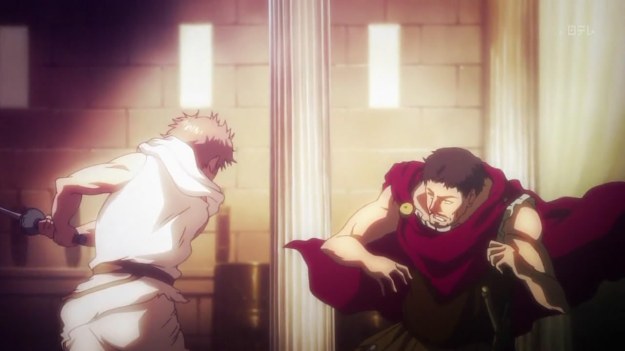
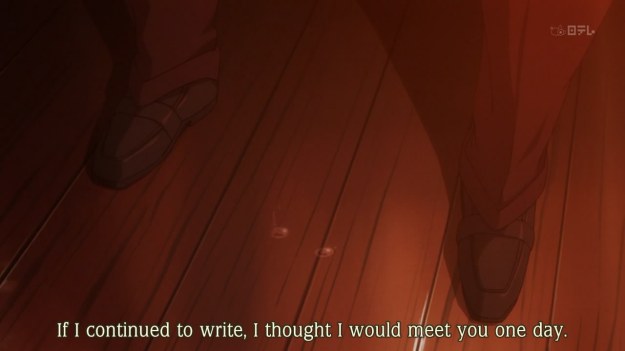
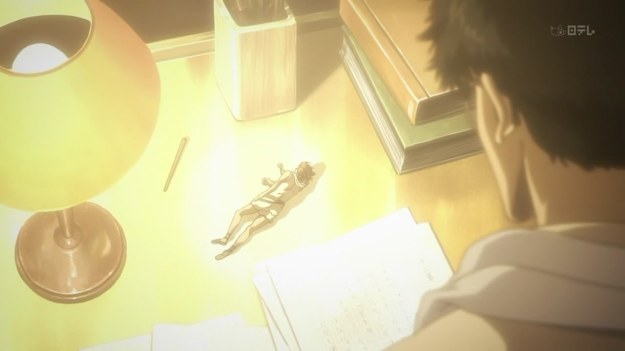
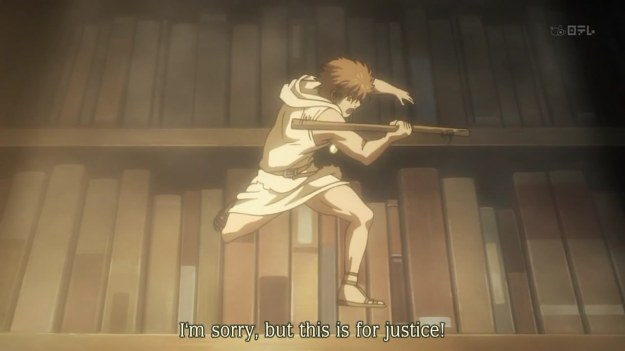

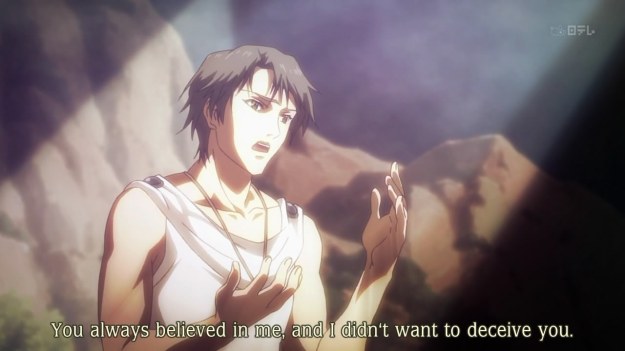

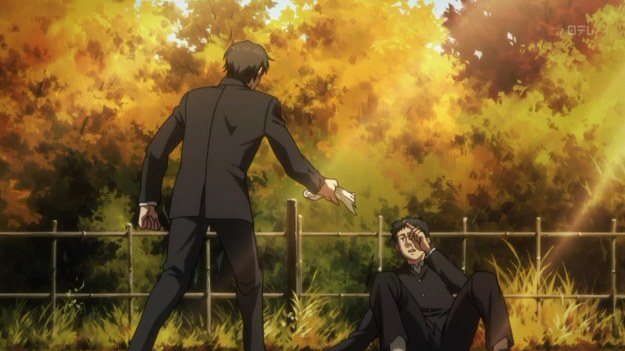
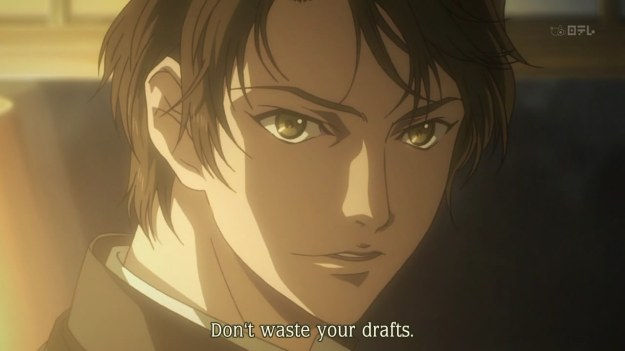
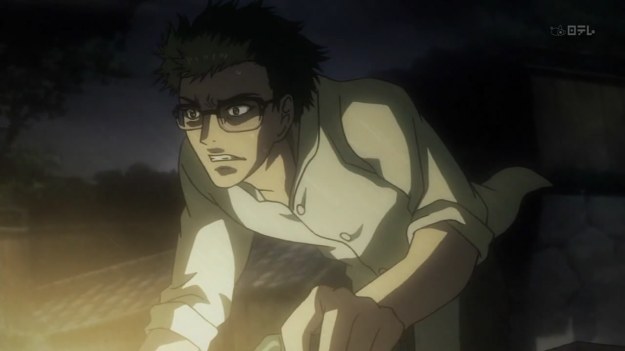


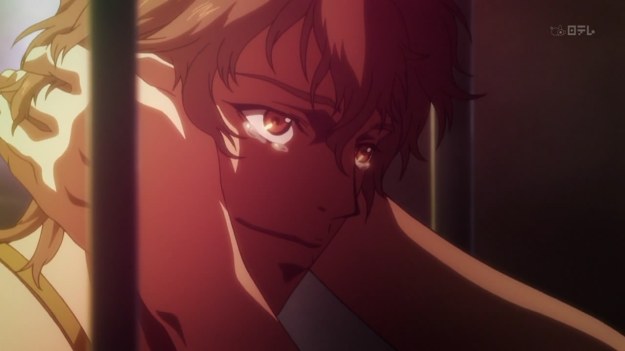

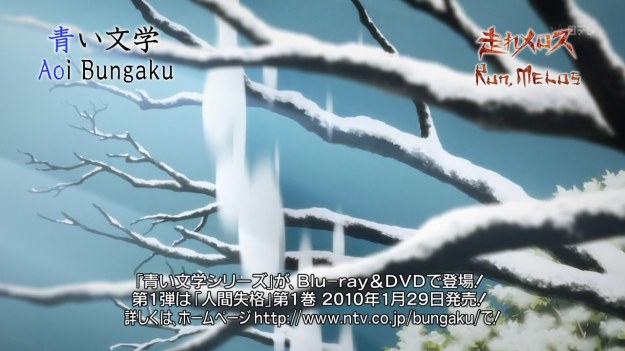



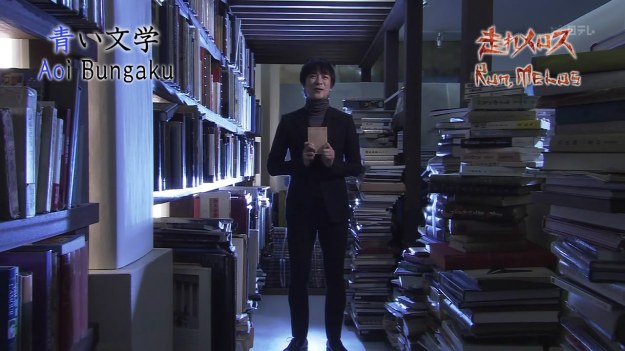
Wow, that was a fantastic essay about Run, Melos. I think you covered just about everything that could be said about it. I agree, it was a great story arc, though I wish I knew why Joushima broke his promise (was it because of his illness? Then why did he make the promise?) But I guess that’s not as important as the theme of friendship, trust, etc,.
Once again, excellent thoughts.
When he made the promise, Joushima had confessed shortly beforehand that he couldn’t remain “here” any longer. It was his idea to leave, after all. I think the issues were bigger than simply an illness; in the end, he didn’t have the courage to leave. I alluded to some negative social stigmas possibly affecting his decision in the post above and I still stand by them.
WOW. It NEVER occured to me Selinuntius was Joushima. From the very beginning I saw that for Takada writing out the play was testing his understanding of what went wrong between him and Joushima. Melos was Joushima and Selinuntius was Takada. Selinuntius and Takada were both the ones kept waiting and had absolute faith in their other friend. This was especially affirmed to me in the scene where Takada imagines Melos is Joushima and he’s explaining what is going on in his heart as he keeps Selinuntius waiting. Out of anger at this could be genuine explanation, Takada screams “You’re lying”. This is only the ideal Scenario Takada wishes was the truth. but you can never be sure. afterall, “you never know what it is people’s hearts”. I agree with what you said of Dionys.
By the way, you’re take of the story helped me understand the ending more. The whole, if Selinuntius lives it means Takada forgives Joushima. With my understanding of how the play relates to Takada, the ending didn’t entirely click with me. I thought Joushima was very unapologetic and aloof, so his tears caught me by surprise and I thought Takada was oddly kind and understanding for not having received any sort of explanation for Joushima’s betrayal. That didn’t seem like begging for forgiveness to me. Your essay was totally eye-opening for me.
Last thing. Why can’t a guy feel strongly for another guy without being gay? Sure, I too felt the Romeo and Juliet thing was a bit suspicious and felt taken aback, much like Takada in that moment, but that’s no reason to jump to conclusions. Particularly in the case of Selinuntius and Melos. The way he was holding Melos’s head and the look on Melos’s face, I could feel the love flooding out from the screen, but it was BROTHERLY LOVE. FRIENDHSHIP LOVE. much like how a mother looks at her kids. By the way, that was my favorite scene in the story. It was so warm and loving. also that loco chat Takada had with that lady over the phone was pretty funny. Back on topic, if my friend ever did that to me, I would be devastated just the same. this was a decision that determined the rest of their lives. have you ever believed so strongly in something, anything, that a certain event would happen or whatever, but it failed to happen. The higher your expectations of something, the more crushing it is when it doesn’t happen. I couldn’t totally empathize with Takada’s devastation. and the fact that Joushima never contacted him after that made him all the sadder. If Joushima had a legitamate reason for not having gone on that train, don’t you think he would have contacted Takada, explained himself, and apologized? but no. though Takada was clearly angry and distraught, Joushima willingly just left it at that. seriously, what a moron. years of regret could have been avoided if he had just called Takada to talk things over. they could have agreed to be pen pals.
*sigh* what an awesome story… v_v
I agree with you , in some of what you had wrote ,
even the hate of that man in the starting. (by the why he is the voice actor for a lot of characters in this series especially Melos!! I did like his voice !)
yah return to what I want to add …
the things I don’t agree with you about it ( the love between men)
it is just friendly or brotherly love , for me.
also I see that Joushima show as Selinuntius
cause Selinuntius will sacrifice himself for the sake of his friend
but Joushima did !! he was the one who want to travel /run away
and he was the one who was suffering by his father.
then he just think about Takada job success.(Tokyo will give him more chances)
so he let him go alone to not cause him any troubles (the things you mention )
and Takada understood this after 15 years that why he return with a forgiving heart
and the prove for this , is when Joushima keep saying do not waste your drafts ,
and even when he is in his last day, he said did you complete your story ?
———-
and yah for the cry it simple !!
cause he is so naive and shy with no confidence ,
as we see he always tears his draft
and even felt so surprise that he win .
also he said that he is alone and just have only one friend.
and just the papers is which full his emptiness .
——
You couldn’t have summed this up more beautifully. All the complexities in the movie have been captured and explained very well indeed. I like how you explained all the cross-symbolisations of the characters too, for I was still a bit confused about it until I stumbled across your piece here.
About the love between those two characters, I too have a sneaky feeling that it could be more than just bromance. Perhaps it’s because I’m rather Yaoi-oriented, but yeah, there are lots of pointers (though not definite) throughout the movie – the Romeo and Juliet one just hit the spot.
I hate you. I cried watching this, and now I will be sleep-deprived to-morrow.
Good post.
Hey, that’s just the sign of a good anime, not HNNGH-ness.
Dude I hate that fucking guy who always talks in the beginning! I thought I was the only one! I definitely agree with what you said, and you know what, you definitely make a good point in the relationship between the two main characters. geez I don’t think I could get half of this on my own, keep posting!
Thanks for the kind words.
That guy is the voice actor of all the main characters across Aoi Bungaku story adaptations. :D
Just watched this, stumbled here looking for more on Dazai’s inspiration for writing it.
I gotta agree: You wrote an amazing essay.
/bookmark
Thanks. Keep spreading the word! Not about my post, but Aoi Bungaku. Everyone should appreciate what Madhouse did nearly two years ago and ignore the money-grabbing travesties they’re pumping out now.
I’m dying to find out why none of them attempted to contact each other for 15 years. If Takada really wanted to know why Joushima broke the promise, he could have called, or even taken a train back and asked him directly. That doesn’t take too much time or effort, does it? And to suffer for 15 years because of something so trivial, I find it really silly and not worth sympathizing with.
As for their relationship, I think it is certainly more than just normal friendship. Seriously, Takada had been constantly thinking of Joushima every second of his life. Does that sound like normal friend to you? They might actually become a couple if they live in this century.
Apart from that, the essay is fantastic! Well explained! Love it.
Pragmatism just doesn’t make for compelling drama.
You made this arc justice. Excellent commentary! I was kinda ‘blinded’ by the factual knowledge that the play is another vesrion of Damon and Fidias and overlooked all the important things you noted.
May be late to comment, but i actually didnt find the dude at the beginning annoying, but i do agree its abit corny, however, its not really his fault but the director (or whoever ask him to act that way) considering he’s actually a talented actor.
I kind of enjoy that scene mainly because he kinds of explain stuff about the authors, but i do agree that it could’ve been filmed better.
Apart from my opinions, this is really an excellent write up! and i didn’t actually noticed the ‘deeper’ meanings until you pointed it out:)
I came across here through the sole purpose of searching for some sense of understanding to the cause of bitterness in the relationship of the two men, and end up receiving more than I had hoped for, by reading your essay here. This deep interpretation of the story is beautiful in it’s very own essence. Thank you for sharing this. <3
Thanks.
This is a nice summary an thoughts.
I don’t know, but there’s a nagging feeling telling me Joshima actually planned this out.